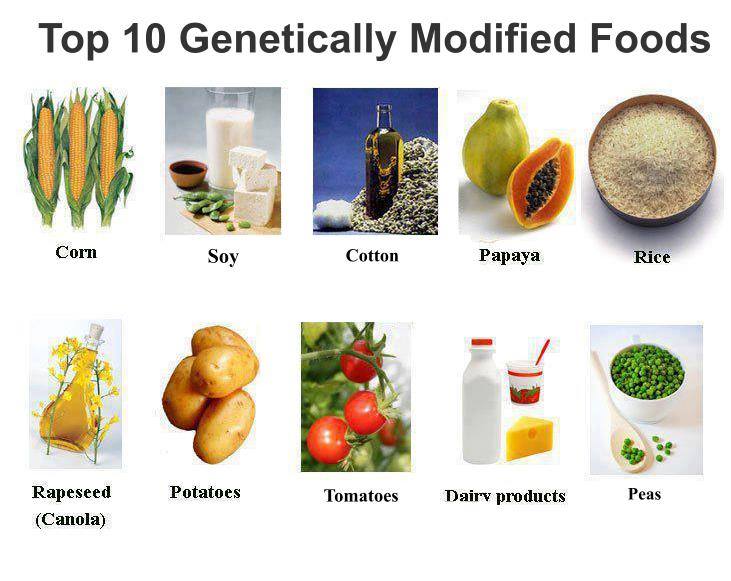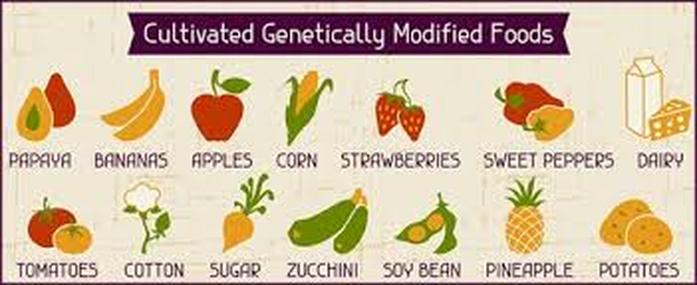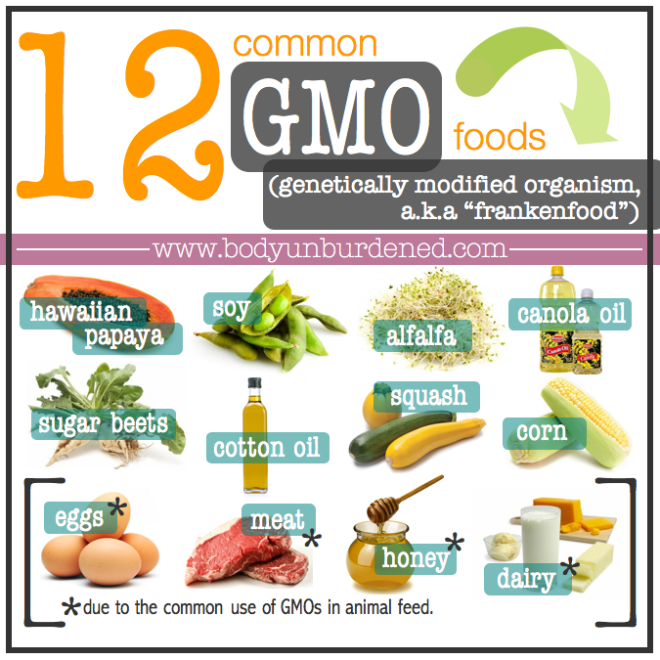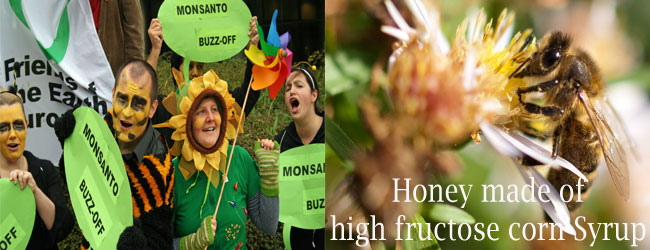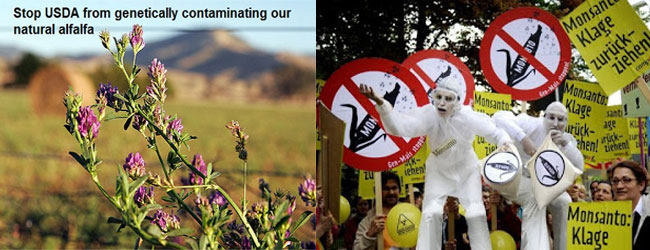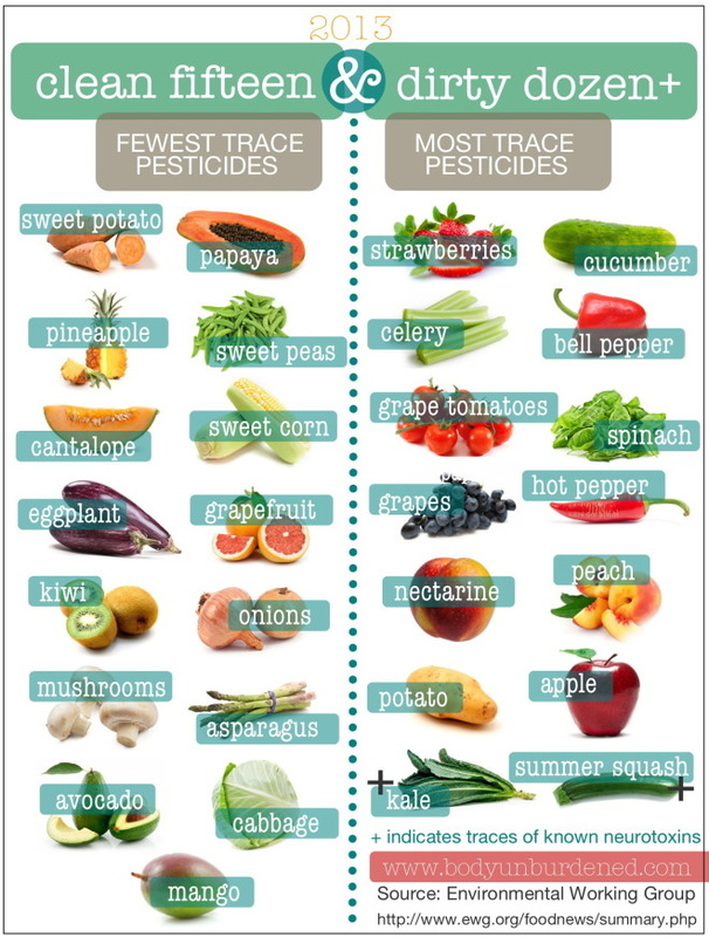Top 20 Foods and Products that have been Genetically Modified
The debate over labeling genetically modified organisms still continues in US while 27 different countries have banned GMOs and 50 countries across the globe have requited GMO labeling. The voters in California will make the final decision this November to label GMOs. Meanwhile customers should be aware of the food products that have already been genetically modified and aren’t properly labeled.
Many independent studies and research performed by the concerned scientific community have warned the public about potential GMO harms and dangers. However due to lack of proper labeling, many foods could be genetically modified without your knowledge. Here are the top 20 foods that have been genetically modified:
1. Cotton Seeds
Almost half of cottons grown in the world have been genetically modified to resist pests and pesticides. GMO BT cotton has had devastating results in Indian agriculture causing suicide of 250,000 Indian farmers in the last decade. Dr. Vandana Shiva in a study shows how GM cotton have lead to Indian farmers suicide and soil infertility by killing useful microorganisms in the soil.Monsanto's Bt Cotton Kills the Soil as Well as FarmersAlso in March 2006, the shepherds of Warangal district reported the death of nearly 2,000 sheep after gazing on GMO cotton crops from sever inflammation and toxicity of intestine.Mortality in Sheep Flocks after grazing on Bt Cotton fields – Warangal District, Andhra PradeshConsumers should be aware that cottonseed oil are extracted from cotton plant seeds and is consumed by us in many foods.
2. Jatropha
The seeds of Jatropha plant are like palm oil and can be used as biofuel. The extracted oil from the Jatropha seeds is a high source of protein and can be used for feeding livestock. However planting Jatropha seeds have caused destruction of the native plants and devastating results in agricultural practices in India.
3. Rice
Both Golden rice and flood resistant rice have now been genetically modified to contain high levels of vitamin A. However Daily China reported about the serious environmental and health issues such as increase in allergies related to GMO rice.GM rice has long-term risks
4. Soy:
More than 90 percent of soybeans grown in the United States are genetically modified. GMO Soy compounds can block normal estrogen; disrupt endocrine function, cause infertility, increase the chances of allergies and breast cancer. Soy can also cause vitamin B12 deficiencies and interfere with protein digestion. GMO soy can be found in pastries, soy tofu, soybean oil, soy milk, soy flour, soy protein, soy lecithin, soy beverages and many famous infant formulas. In fact GMO rats that were fed GMO soy had higher rate of death and infertility.The Health Dangers of Soy by Dr. Joseph MercolaCould Eating Too Much Soy Be Bad for You?
5. Sugar Beets:
GMO sugar beets were engineered to grow faster and to be more resistant to weeds. However a federal judge put a halt on processing GMO sugar beets due to failure of USDA to present an Environmental Impact Statement (EIS). Many environmentalists and researchers are concerned that GMO sugar beets could have serious impacts on the environment and other crops.Federal Judge Halts Planting of GM Sugar Beets For Now
Despite the halt, earlier last year the USDA gave farmers permit to grow Roundup Ready pesticide resistant sugar beets. Now 85% of sugar beets planted in the US are all GMOs.USDA: Farmers can plant genetically modified beetsUSDA Allows GMO Sugar Beet Planting Even After a Landmark Court Decision Says No
6. Yeast
Although the wine institute released a statement that GMO yeast shouldn’t be used in making wines, genetically modified wine yeast, ML01 is out in the market.The Dangers of Genetically Modified Yeast Wine Headaches, histamines and GM yeast [ML01]Genetically modified yeast has been related to increase in headaches and allergies. Make sure you contact the vineyard or the wine maker before purchasing the wine, if you want to make sure they aren't using GMO yeast.
7. Cassava
Cassava is a starchy plant like potato that is consumed by many people across the globe like Africa. The first GMO cassava plant was engineered in 1955. Cassava was supposed to be virus and pest resistant but farmers reported that in few years the GMO cassava lose their anti-virus resistant quality.GM cassava
8. Papaya and Banana
Papaya was first genetically modified in Hawaii and introduced to the market in 1999. Genetically modified papayas aren’t approved in Europe however 50% of papayas that are from Hawaii are genetically modified. Also majority of bananas in the US are genetically modified.
9. Artificial additives, preservatives and sweetenersMany additives, preservatives and food flavoring are genetically modified. Aspartame in diet drinks is sure one of the products of genetic engineering.
10. Potatoes
Genetically modified potatoes are a threat to other organic produce and their biodiversity. Studies showed that mice that were fed GMO potatoes had higher toxins in their blood. Here is the summary of GMO potatoes health risks:Briefing: Summary of the risks of GM potatoes
11. Corn
Most corns produced in America are genetically modified. Corn can be found is almost every processed foods in forms of high fructose corn syrup, citric acid, corn starch, corn oil and corn meal. Many food products such as many breakfast cereals, infant formula, salad dressing, bread, cereal, hamburgers, mayonnaise, veggie burgers, meat substitutes, soy cheese, tomato sauce, crackers, cookies, chocolate, candy, fried food, protein powder, baking powder, alcohol, vanilla, powdered sugar, peanut butter, ice cream, frozen yogurt, tofu, tamari, soy sauce, enriched flour and pasta have high levels of GMO corn. GMO corns have been related to infertility, tumors, and increase in food allergies.
12. Tomatoes
GMO tomatoes are banned in Europe but many tomatoes have been genetically modified in US. Tomatoes are genetically modified to last longer and not get rotten quickly. GMO tomatoes have been related to premature death in lab rats.GMO Tomatoes
13. Squash
Squash was genetically modified to become more resistant against viruses and bacteria. However the cucumber cockroaches love to feed on GMO squash and start wounding the leaves and leaving open holes in them. The cockroaches’ feces get absorbed into the stem of genetically modified squash and cause bacterial diseases. Some experts also believe that GMO squash have been blended into the wild plant and that might increase the chances of new pathogens and bacterial diseases.
14. Oils
Most vegetable oils used in production of processed foods are genetically modified. Cotton seed oil, corn oil and soy oil are mostly genetically modified and produced in US, India and China. Also most canola crops in Canada have also been genetically modified. Both GMO cottonseed oil, GMO canola oil (rapeseed oil) are genetically modified to be resistant to pesticides. Before genetic modification, canola oil or rapeseed oil was too bitter to be used in foods. However the best healthy oil for cooking is organic grapeseed oil and the best cold-pressed oil for salad dressing is olive oil. Be aware that cold pressed oils like olive or coconut shouldn’t be exposed to heat.
15. Animals that are fed GMO
US, Brazil and Argentina are the three main exporters of GMO soybeans. Most cows, pigs and chickens maize on GMO corn and soy except the ones that are certified organic or grass fed. Also most dairy products in US are produced from animals that have been injected with rBGH growth hormones and antibiotics. rBGH growth hormones and antibiotics can increase the chances of breast and prostate cancer, allergies and make body more resistant to antibiotics.
16. Salmon
GMO salmon grows a lot faster than wild salmon and it grows twice as size. AquAdvantage is the GMO salmon that can be grown as farmed fish. Many environmentalists and scientists are worried that GMO salmon could have negative impact on the environment and mutate over time. Wild salmon is the is low- mercury salmon and best for consumption.Giant salmon will be first GM animal available for eating
17. Peas
Genetically modified peas are created by inserting kidney beans genes into the peas DNA and creating a protein that functions as a pesticide. Studies show that genetically modified peas can cause lower immune system in human beings.
18. Alfalfa
Genetically modified alfalfa could be a serious threat to organic sustainable agriculture. Alfalfa has been found to be an amazing source of nitrogen for the soil and increasing fertility. However GMO alfalfas are treated with Monsanto’s Roundup ready that have been related to many health problems including a mysterious organism. Dr. Don Huber found a new mysterious organism in crops that were treated with Roundup. This new organism can cause disease in crops, increase infertility and potentially harm the US food supply.
He wrote a letter to Tom Visak, the secretary of agriculture who was called the governor of the year by biotech companies, to put a halt on Roundup until further studies are performed but his letter was ignored and never replied. Despite many concerns by the scientific communities, the FDA and USDA approved genetically modified alfalfa. Approving genetically modified Alfalfa can increase the chance of cross-contamination since alfalfa is pollinated by insects. In few years the new gene can contaminate all the crops in America and that could be a serious threat to organic sustainable agriculture.U.S. Approves Genetically Modified AlfalfaEnd of Organics? Monsanto’s GMO Alfalfa Approved
19. Pork
A project called “Enviropig” has been going on in Canada since 1999 to genetically modify pigs by taking genes from mice and E.Coli bacteria and inserting it into pigs. However there are still concerns among the scientific community about the environmental impacts of GMO pigs and their safety for human consumption.Genetically Modified Pig "Enviropig" shelvedMajor Canadian food processor says no to GM Enviropig
20. Honey
The Canadian export of honey was banned to Europe after the honeybees in Canada were feeding off of GMO canola. In US 75% of honey you find in the grocery stores are made of high fructose corn syrup with no nutritional value. If you’re looking for non-GMO honey you should buy organic raw honey.
- See more at: http://seattleorganicrestaurants.com/vegan-whole-foods/top-20-genetically-modified-foods/#sthash.XVbCVjaJ.dpuf
The debate over labeling genetically modified organisms still continues in US while 27 different countries have banned GMOs and 50 countries across the globe have requited GMO labeling. The voters in California will make the final decision this November to label GMOs. Meanwhile customers should be aware of the food products that have already been genetically modified and aren’t properly labeled.
Many independent studies and research performed by the concerned scientific community have warned the public about potential GMO harms and dangers. However due to lack of proper labeling, many foods could be genetically modified without your knowledge. Here are the top 20 foods that have been genetically modified:
1. Cotton Seeds
Almost half of cottons grown in the world have been genetically modified to resist pests and pesticides. GMO BT cotton has had devastating results in Indian agriculture causing suicide of 250,000 Indian farmers in the last decade. Dr. Vandana Shiva in a study shows how GM cotton have lead to Indian farmers suicide and soil infertility by killing useful microorganisms in the soil.Monsanto's Bt Cotton Kills the Soil as Well as FarmersAlso in March 2006, the shepherds of Warangal district reported the death of nearly 2,000 sheep after gazing on GMO cotton crops from sever inflammation and toxicity of intestine.Mortality in Sheep Flocks after grazing on Bt Cotton fields – Warangal District, Andhra PradeshConsumers should be aware that cottonseed oil are extracted from cotton plant seeds and is consumed by us in many foods.
2. Jatropha
The seeds of Jatropha plant are like palm oil and can be used as biofuel. The extracted oil from the Jatropha seeds is a high source of protein and can be used for feeding livestock. However planting Jatropha seeds have caused destruction of the native plants and devastating results in agricultural practices in India.
3. Rice
Both Golden rice and flood resistant rice have now been genetically modified to contain high levels of vitamin A. However Daily China reported about the serious environmental and health issues such as increase in allergies related to GMO rice.GM rice has long-term risks
4. Soy:
More than 90 percent of soybeans grown in the United States are genetically modified. GMO Soy compounds can block normal estrogen; disrupt endocrine function, cause infertility, increase the chances of allergies and breast cancer. Soy can also cause vitamin B12 deficiencies and interfere with protein digestion. GMO soy can be found in pastries, soy tofu, soybean oil, soy milk, soy flour, soy protein, soy lecithin, soy beverages and many famous infant formulas. In fact GMO rats that were fed GMO soy had higher rate of death and infertility.The Health Dangers of Soy by Dr. Joseph MercolaCould Eating Too Much Soy Be Bad for You?
5. Sugar Beets:
GMO sugar beets were engineered to grow faster and to be more resistant to weeds. However a federal judge put a halt on processing GMO sugar beets due to failure of USDA to present an Environmental Impact Statement (EIS). Many environmentalists and researchers are concerned that GMO sugar beets could have serious impacts on the environment and other crops.Federal Judge Halts Planting of GM Sugar Beets For Now
Despite the halt, earlier last year the USDA gave farmers permit to grow Roundup Ready pesticide resistant sugar beets. Now 85% of sugar beets planted in the US are all GMOs.USDA: Farmers can plant genetically modified beetsUSDA Allows GMO Sugar Beet Planting Even After a Landmark Court Decision Says No
6. Yeast
Although the wine institute released a statement that GMO yeast shouldn’t be used in making wines, genetically modified wine yeast, ML01 is out in the market.The Dangers of Genetically Modified Yeast Wine Headaches, histamines and GM yeast [ML01]Genetically modified yeast has been related to increase in headaches and allergies. Make sure you contact the vineyard or the wine maker before purchasing the wine, if you want to make sure they aren't using GMO yeast.
7. Cassava
Cassava is a starchy plant like potato that is consumed by many people across the globe like Africa. The first GMO cassava plant was engineered in 1955. Cassava was supposed to be virus and pest resistant but farmers reported that in few years the GMO cassava lose their anti-virus resistant quality.GM cassava
8. Papaya and Banana
Papaya was first genetically modified in Hawaii and introduced to the market in 1999. Genetically modified papayas aren’t approved in Europe however 50% of papayas that are from Hawaii are genetically modified. Also majority of bananas in the US are genetically modified.
9. Artificial additives, preservatives and sweetenersMany additives, preservatives and food flavoring are genetically modified. Aspartame in diet drinks is sure one of the products of genetic engineering.
10. Potatoes
Genetically modified potatoes are a threat to other organic produce and their biodiversity. Studies showed that mice that were fed GMO potatoes had higher toxins in their blood. Here is the summary of GMO potatoes health risks:Briefing: Summary of the risks of GM potatoes
11. Corn
Most corns produced in America are genetically modified. Corn can be found is almost every processed foods in forms of high fructose corn syrup, citric acid, corn starch, corn oil and corn meal. Many food products such as many breakfast cereals, infant formula, salad dressing, bread, cereal, hamburgers, mayonnaise, veggie burgers, meat substitutes, soy cheese, tomato sauce, crackers, cookies, chocolate, candy, fried food, protein powder, baking powder, alcohol, vanilla, powdered sugar, peanut butter, ice cream, frozen yogurt, tofu, tamari, soy sauce, enriched flour and pasta have high levels of GMO corn. GMO corns have been related to infertility, tumors, and increase in food allergies.
12. Tomatoes
GMO tomatoes are banned in Europe but many tomatoes have been genetically modified in US. Tomatoes are genetically modified to last longer and not get rotten quickly. GMO tomatoes have been related to premature death in lab rats.GMO Tomatoes
13. Squash
Squash was genetically modified to become more resistant against viruses and bacteria. However the cucumber cockroaches love to feed on GMO squash and start wounding the leaves and leaving open holes in them. The cockroaches’ feces get absorbed into the stem of genetically modified squash and cause bacterial diseases. Some experts also believe that GMO squash have been blended into the wild plant and that might increase the chances of new pathogens and bacterial diseases.
14. Oils
Most vegetable oils used in production of processed foods are genetically modified. Cotton seed oil, corn oil and soy oil are mostly genetically modified and produced in US, India and China. Also most canola crops in Canada have also been genetically modified. Both GMO cottonseed oil, GMO canola oil (rapeseed oil) are genetically modified to be resistant to pesticides. Before genetic modification, canola oil or rapeseed oil was too bitter to be used in foods. However the best healthy oil for cooking is organic grapeseed oil and the best cold-pressed oil for salad dressing is olive oil. Be aware that cold pressed oils like olive or coconut shouldn’t be exposed to heat.
15. Animals that are fed GMO
US, Brazil and Argentina are the three main exporters of GMO soybeans. Most cows, pigs and chickens maize on GMO corn and soy except the ones that are certified organic or grass fed. Also most dairy products in US are produced from animals that have been injected with rBGH growth hormones and antibiotics. rBGH growth hormones and antibiotics can increase the chances of breast and prostate cancer, allergies and make body more resistant to antibiotics.
16. Salmon
GMO salmon grows a lot faster than wild salmon and it grows twice as size. AquAdvantage is the GMO salmon that can be grown as farmed fish. Many environmentalists and scientists are worried that GMO salmon could have negative impact on the environment and mutate over time. Wild salmon is the is low- mercury salmon and best for consumption.Giant salmon will be first GM animal available for eating
17. Peas
Genetically modified peas are created by inserting kidney beans genes into the peas DNA and creating a protein that functions as a pesticide. Studies show that genetically modified peas can cause lower immune system in human beings.
18. Alfalfa
Genetically modified alfalfa could be a serious threat to organic sustainable agriculture. Alfalfa has been found to be an amazing source of nitrogen for the soil and increasing fertility. However GMO alfalfas are treated with Monsanto’s Roundup ready that have been related to many health problems including a mysterious organism. Dr. Don Huber found a new mysterious organism in crops that were treated with Roundup. This new organism can cause disease in crops, increase infertility and potentially harm the US food supply.
He wrote a letter to Tom Visak, the secretary of agriculture who was called the governor of the year by biotech companies, to put a halt on Roundup until further studies are performed but his letter was ignored and never replied. Despite many concerns by the scientific communities, the FDA and USDA approved genetically modified alfalfa. Approving genetically modified Alfalfa can increase the chance of cross-contamination since alfalfa is pollinated by insects. In few years the new gene can contaminate all the crops in America and that could be a serious threat to organic sustainable agriculture.U.S. Approves Genetically Modified AlfalfaEnd of Organics? Monsanto’s GMO Alfalfa Approved
19. Pork
A project called “Enviropig” has been going on in Canada since 1999 to genetically modify pigs by taking genes from mice and E.Coli bacteria and inserting it into pigs. However there are still concerns among the scientific community about the environmental impacts of GMO pigs and their safety for human consumption.Genetically Modified Pig "Enviropig" shelvedMajor Canadian food processor says no to GM Enviropig
20. Honey
The Canadian export of honey was banned to Europe after the honeybees in Canada were feeding off of GMO canola. In US 75% of honey you find in the grocery stores are made of high fructose corn syrup with no nutritional value. If you’re looking for non-GMO honey you should buy organic raw honey.
- See more at: http://seattleorganicrestaurants.com/vegan-whole-foods/top-20-genetically-modified-foods/#sthash.XVbCVjaJ.dpuf

